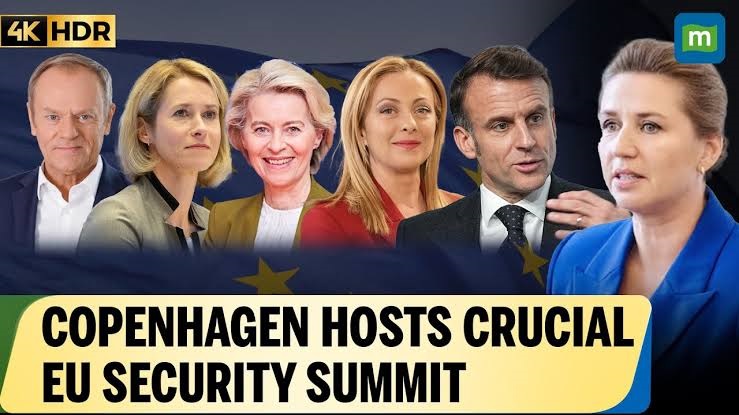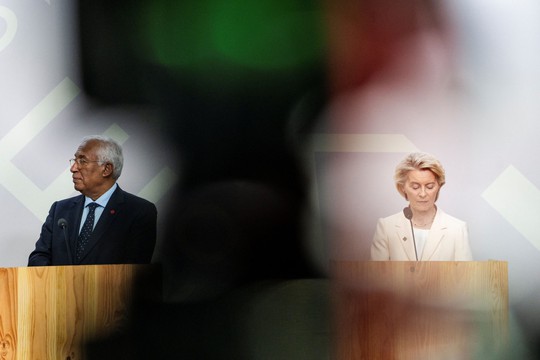Deadlock in Copenhagen. Hours of debate between EU leaders produced few results. President of the European Commission Ursula von der Leyen, and President of the European Council, Antonio Costa (left) attend a press conference at the end of an informal summit for the EU's heads of state and government, at Christiansborg Palace in Copenhagen, Denmark, October 1, 2025.
Photo: REUTERS
EU leaders met for a one-day summit to discuss how to strengthen Europe's common defence and support for Ukraine at informal meeting of heads of state or government, Copenhagen, 1 October 2025, ‘Consilium Europa’ reports.
The meeting was chaired by the President of the European Council, António Costa, and hosted by the Prime Minister of Denmark, Mette Frederiksen. It took place before the meeting of the European Political Community.
Faced with a radically changed security situation in Europe, EU leaders discussed how to strengthen our common defence, including issues relating to defence capacities, support for the Eastern flank and governance.
In that context, the EU is committed to building up its defence and ramping up its defence readiness by 2030. In recent months, the EU has taken decisive action to achieve that goal, including through the SAFE instrument which mobilises up to €150 billion in loans and other means to channel joint investments that benefit Europe's security as a whole.
President Costa stated that the leaders broadly supported priority flagships presented by the Commission and the High Representative, including the European Drone Wall and the Eastern Flank Watch.
With regard to Ukraine's path to EU membership, President Costa underlined that Ukraine has been delivering on the accession reforms and that it is time for the EU to deliver, as enlargement is a merit-based process that will help make Europe stronger.

From proposing a “drone wall” to using frozen assets, the agenda was long and detailed. The results, less so, POLITICO notes.
European Union leaders spent a day in the Danish capital discussing how to bolster the continent’s security.
It didn’t go quite according to plan, with a great deal of talk but few results. Leaders are no less worried than they were before.
Here’s what happened:
1. Frozen assets stay in the freezer, for now
EU countries were not ready to endorse a European Commission plan to use Russian frozen assets to finance a loan to Ukraine.
The Commission wants to offer Ukraine a €140 billion loan, swapping the sanctioned Russian cash from the matured assets for a tailored debt contract with Euroclear, the Belgian-based financial institution guarding the deposits. EU officials see this as a clever workaround to avoid expropriating them, which could breach international law.
One of the reasons the deal was not agreed in Copenhagen is that some countries, especially Belgium, need to be reassured the plan is legally sound.
Belgian Prime Minister Bart De Wever was the most cautious, as his country would bear the brunt of any Russian legal action.
After the summit, Commission President Ursula von der Leyen tried to reassure Belgium and other reluctant countries that under her plan the assets wouldn’t be confiscated and that “the risks have to be put on broader shoulders.”
But that wasn’t enough, or at least not yet. The next summit, later this month, could be “decision day,” European Council President António Costa said.
2. Leaders tell the Commission: We’re still in charge of defense
The two hours on the schedule for talking about common defense ended up taking twice that long.
While countries broadly welcomed the Commission’s proposals, leaders insisted on having a bigger say.
Given the need for further discussion, meetings among the bloc’s 27 defense ministers and the EU’s top diplomat Kaja Kallas will happen more frequently, said an EU official with knowledge of the summit proceedings.
The EU still needs to work out the details of the so-called drone wall, which didn’t see agreement on Wednesday. This will be “an anti-drone system that is able to do swift detection, interception and of course, if necessary, neutralization,” von der Leyen said.
European heavyweights France and Germany expressed skepticism of a drone wall managed by the Commission, while southern countries are pushing for a broader concept that will also protect their borders.
3. Merz didn’t manage to set the agenda
German Chancellor Friedrich Merz went into the summit wanting to talk about competitiveness — and failed.
“We will have two major topics to discuss: firstly, the competitiveness of European industry and the high, too high, level of regulation in Europe,” Merz told reporters upon his arrival in Copenhagen. “Secondly, unfortunately, we will have to talk again about the war against Ukraine.”
It seemed Merz hadn’t bothered to read the official schedule, which included one session on defense and one on Ukraine. Officials at the summit were under no illusion, though, that his message was tailored toward a domestic audience. The German leader is under increasing pressure to revamp the EU’s biggest economy and deliver on the sweeping reforms and rapid turnaround he staked his election bid on.
4. Royal appointments trump everything else
The end point of the Copenhagen summit was dictated by a dinner invitation. The Danish royals invited EU leaders for dinner at 7 p.m. sharp.
That appointment added the pressure of a deadline. But the session on security and defense took four hours, twice as long as scheduled, because leaders went beyond their pre-written talking points and free-styled answers. Costa, who chaired the meeting, didn’t dare cut the mic given how sensitive the talks were, said an EU official, who denied the talks took longer because of disagreements among leaders.
Leaders eventually made it to the dinner on time. Only von der Leyen, Costa and Fredriksen returned to the summit venue to brief the press.
5. All the members of the club want to decide who can enter
Costa’s idea of fast-tracking Ukraine’s bid to join the EU didn’t work. And that was no surprise.
As POLITICO first reported on Monday, Costa suggested changing EU rules so that formal accession talks could begin with the backing of a qualified majority of leaders, instead of requiring unanimous consent. That was a no-go for the Hungarian prime minister, who is the EU leader closest to Russian President Vladimir Putin. But other countries, including France, the Netherlands and Greece, were also opposed and let the proposal sink.
During the summit, Orbán was one of the few leaders to talk about the plan. And that was to reject it.
read more in our Telegram-channel https://t.me/The_International_Affairs

 10:46 03.10.2025 •
10:46 03.10.2025 •























